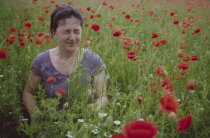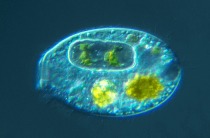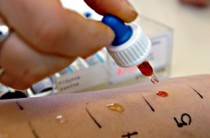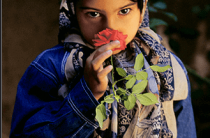The most long-awaited moment in a woman's life is the time of pregnancy. During this period, all the protective reactions of the body are directed to the fetus and the immunity of the expectant mother weakens. With the onset of pregnancy, lifestyle and diet change. All this often causes allergic reactions, especially in the early stages, when the body still does not understand anything and is in a “state of bewilderment”. Allergies cause a lot of trouble and discomfort. And the main problem is that many medicines and herbal preparations are prohibited for pregnant women.
Causes of allergies in pregnant women
Symptoms may vary, depending on the cause that preceded the reaction. At this time, the body reacts very sharply to absolutely everything: food, smells, cosmetics, air, sun, and so on. Therefore, the first reason to note is the diet of a pregnant woman.
Trying to saturate her body with vitamins and microelements, a woman, with the onset of pregnancy, consumes vegetables and fruits in excessive quantities. This leads to an excess of them in the body and causes allergies. Eat only in moderate doses. Products that provoke allergies in early pregnancy: smoked meats, pickles, sausages, canned food, convenience foods, fish, citrus fruits, berries. Eggs and cow's milk should be used with extreme caution. Meats such as pork and lamb can also be harmful. It would seem that ginger is a useful product. But in the early stages of pregnancy is contraindicated. It contains vinegar, which is strictly prohibited for pregnant women.
Rosehip drinks are rich in vitamin C, but in pregnant women it can cause uterine tone, which will eventually lead to miscarriage. And such a berry as cranberry provokes overweight of the fetus. You should be careful when using honey.
The next cause of allergies can be a change in hormonal levels. Allergens can surround at home, in everyday life. Often it is dust and pets. In this regard, doctors recommend giving their pets in good hands during pregnancy. A lot of trouble brings contact with detergents and cleaning products. Especially dangerous are household chemicals and decorative cosmetics starting from the 20th week of pregnancy.
Allergy symptoms
At the time of bearing a child, allergies can be of any kind: skin, respiratory and food. What are its manifestations?
| Cutaneous | Rash, redness, severe itching, burning. Scabs, inflamed wounds may occur. |
| Respiratory | Runny nose, sneezing, rhinitis, conjunctivitis, cough, choking. |
| food | Vomiting, nausea, stomach pain, rash all over the body. |
One of the signs of an allergy is swelling. This symptom occurs when a woman is allergic to insect bites. The bite site can increase five or even ten times. At the same time, Quincke's edema is very dangerous. In the early stages, often an allergy manifests itself on a woman's face.
The harm of an allergy to the fetus
In this matter, doctors reassure. Allergies will not particularly affect the fetus in the way that allergens are not able to penetrate the placenta to the baby. The intake of various drugs and the general unsatisfactory condition of the mother can negatively affect. The expectant mother experiences discomfort, with a rash itches and is nervous. Is under stress. All this is dangerous in the early stages of pregnancy, when the body makes attempts to rebuild in a new way, taking into account all the hormonal changes. And this is without taking into account toxicosis in the first trimester.
At the time of the mother's nasal congestion, the child may suffer from a lack of oxygen. Oxygen starvation is very dangerous for the fetus in the first trimester of pregnancy, since at this time the process of formation of all internal organs takes place.
How to treat allergies in the early stages?
Here you should immediately say that you need to run to the doctor. At the time of bearing a child, you should not engage in treatment. After all, you are not harming yourself, you are harming the baby. Before going to the doctor, take the following steps:
- Switch to a hypoallergenic diet;
- Avoid contact with all possible allergens.
| Not all antiallergic drugs are allowed to be taken by pregnant women | |
| Suprastin | Allowed in the second and third trimester, but only in emergency cases and under the supervision of a doctor. With acute allergic manifestations. |
| Tavegil | It is not recommended to use during pregnancy, as it threatens the normal development of the fetus. |
| Pipolfen | Contraindicated during gestation. |
| Claritin | Allowed during pregnancy, but only as prescribed by the attending physician. |
| Diphenhydramine | Contraindicated in pregnant women, as it can cause uterine contractions. |
| Terfenadine | It is not recommended to take during pregnancy, as it reduces the weight of the fetus. |
| Astemizol | A very toxic drug, prohibited for use during the period of bearing a child. |
| Tsetrin | Approved for use only under the supervision of a physician. |
Many ointments also have many contraindications. But much safer than pills. It is very important to use anti-allergic ointments and creams for rashes. Indeed, when combing, wounds are formed through which the infection penetrates and harms the fetus. In general, all anti-allergic ointments are divided into the following categories: anti-inflammatory, hormonal, moisturizing and combined.
| Anti-inflammatory ointments | |
| Fenistil-gel | Allowed during the second and third trimester, but only in small doses and as directed by a doctor. It is possible to use in the first trimester, under strict control. |
| Psilo Balm | Allowed at all stages of pregnancy under medical supervision. |
| Elidel | A very effective drug. It is prescribed if other ointments do not bring the desired result. Allowed during pregnancy, but only on prescription. |
Hormonal ointments , as a rule, are not prescribed during pregnancy. They are very effective, but have a lot of side effects. This type of drug is absorbed through the skin into the blood, which can harm the fetus. It should be noted that there are 3 categories of hormonal ointments. It depends on their action and absorption into the blood. For example, Elocom ointment has a fairly low absorption and can be used during the gestation period under the strict supervision of a physician. As a rule, it is prescribed for a short period of time (3-5 days). But Akriderm belongs to the third category and is not recommended for pregnant women.
Moisturizing ointments are excellent for healing tissues. Relieve itching and nourish the skin. They are the safest for pregnant women. These include:
| Bepanthen | Has healing properties. Perfectly moisturizes the skin. Used for both treatment and prevention. It is allowed to use at any stage of pregnancy. |
| la cree | A fairly effective and safe anti-inflammatory agent. The cream moisturizes and softens the skin. It has no contraindications at the time of bearing a child. |
| D-panthenol | Normalizes the functions of skin tissues, heals damage to the skin. Has a good moisturizing effect. There are no contraindications during pregnancy. |
| Videstim | It is prescribed for eczema, urticaria, swelling. Effectively relieves allergic manifestations on the face and eyelids. But it is contraindicated in the first trimester of pregnancy. |
| Radevit | Used for dermatosis, heals skin wounds and ulcers. Not recommended during pregnancy. |
| emolium | It is prescribed for excessive dryness of the skin, with atopic dermatitis. It has no contraindications for pregnant women. |
If the allergy manifests itself in the form of rhinitis, then there are fairly safe nasal preparations. Nasal drops such as Aqua Maris are a simple saline solution. Which clears the nose and makes breathing easier. Effectively moisturize the nasal mucosa. The basis of such a solution is simple sea salt. Has no contraindications during pregnancy and Pinosol. It contains eucalyptus, pine and mint. Relieves nasal congestion and makes breathing easier. Safe nasal drops also include:
- Marimer;
- Salin;
- Euphorbium;
- Rhinitol.
How to prevent allergies?
The main rule is to exclude possible contact with allergens. This applies not only to the household sphere, but also to food products. You need to eat especially carefully in the first trimester, when the body is just rebuilding. But in the second trimester, the fetus begins to form antibodies to products, which after birth can manifest itself in allergic manifestations. Pregnant women should consume more butter, dietary meat, vegetables, as they are anti-allergic foods. Wool is one of the main causes of allergies in pregnant women. The sharpness of the sensation of various smells can cause an allergy to perfumes.
| Among many vitamins, natural antihistamines are noted. | |
| Vitamin C | in the form of ascorbic acid. Helps with rhinitis attacks. Reduces manifestations of allergic dermatitis. Reduces the body's sensitivity to egg yolk. |
| Fish fat | Prevents runny nose, itching, rash. |
| Oleic Acid | Included in olive oil. excellent remedy for the prevention of allergic reactions. |
| A nicotinic acid | Most effective for hay fever. |
A prerequisite is the observance of a hypoallergenic diet from the first days of pregnancy. Active and passive smoking is strictly prohibited. You should get rid of things "dust collectors". Very useful are walks in the fresh air, preferably in the evening.















